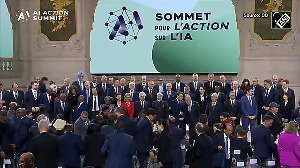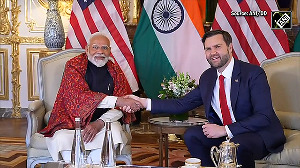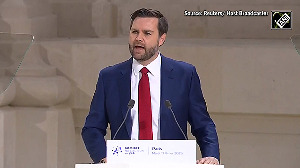The ministerial conference of the World Trade Organisation opened in Cancun on Wednesday with India and a group of 20 developing countries seeking to bring pressure on the United States and European Union demanding immediate drastic reduction of agriculture subsidies in rich nations.
The five-day meeting of 146 countries that will carry on negotiations on the Doha agenda was inaugurated by host Mexican President Vicente Fox making a fervent appeal to make the conference successful in moving forward in trade liberalisation for the benefit of the entire humanity.
| |||||||||||
Ahead of the conference start, India leading a pack of 21 other developing countries issued a hard-hitting joint communique on agriculture which has asked European Union and United States to agree to phased elimination of domestic support and export subsidies on agriculture.
The group feels high subsidies by the rich depressed farm prices in developing countries to the detriment of millions of poor farmers.
The tough tone of the G-21 reflected the arduous bargain that may be in store in the next five days. The group has demanded that its demands be treated the same way as the proposals contained in the WTO draft that has been submitted for consideration in the conference.
The action of G-21 including the latest entrant Egypt angered the European Union and the United States, with EU Trade Commissioner Pascal Lamy attacking the group.
Lamy felt the G-21 proposal would unfairly put the onus for cutting domestic support and further opening up markets entirely on developed countries.
With the European Union making a frontal attack on G-21, India and other developing countries have hardened their stand on agriculture which could make or break the conference.
US Trade Representative Robert Zoellick has already suggested that to keep the negotiations on track there should be yet another ministerial sometime in March next year to meet the deadline of completing the Doha Development round as scheduled by January 1, 2005. This he said would help in keeping the deadline.
Meanwhile, Jaitley has been having a series of bilateral meetings and there was certainly hardening of developing countries' stand on contentious agriculture and Singapore issues.
With several countries rallying round India, China and Brazil on these two issues, the attempts by European Union and United States to split developing countries has not yielded any result so far.
With a large number of activists numbering several thousands gathering in this Caribbean beach resort, Mexican authorities have tightened security with over 20,000 policemen intensifying patrolling in this scenic beach resort.
Some activists even stripped their clothes on the beaches as part of their anti-globalisation protests.
Hong Kong has already offered to host the next conference and it is to be seen if the next ministerial is advanced as suggested by Zoellick.
In his opening remarks, Fox wanted the trade ministers to reaffirm their commitment to a 'fair, equal and transparent world economic and trading system.'
But the European Union criticised the G-21 developing nations including Mexico, for "asking for the moon" regarding the elimination of subsidies, and warned them not to have false expectations about the result of the WTO ministerial conference in Cancun.
"I know that the economic negotiations are not lacking in posturing and rhetoric, but you don't need to exaggerate," said EU Agriculture Commissioner Franz Fischler.
The developing countries have been asking for total elimination of export subsidies, as well as all the subsidies aimed at reducing production.






 © 2025
© 2025